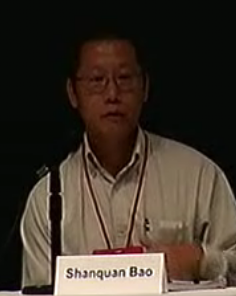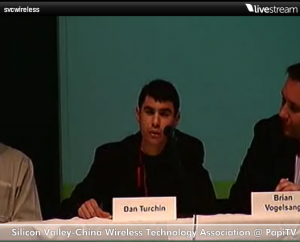![]() The 2009 Silicon Valley China (SVC) Wireless Conference kicked-off yesterday in Mountain View, CA. Ever curious about mobile telecom in Asia, I dropped in to listen, learn, and do a bit of networking. While there were no major revelations at yesterday’s SVC sessions, it was interesting to hear directly from key players in China’s telecom industry, including the keynote address by Dr. Linzhen Xie, Standing Member of Communication Science & Technology Committee Ministry of Industry and Information Technology (MIIT) of China.
The 2009 Silicon Valley China (SVC) Wireless Conference kicked-off yesterday in Mountain View, CA. Ever curious about mobile telecom in Asia, I dropped in to listen, learn, and do a bit of networking. While there were no major revelations at yesterday’s SVC sessions, it was interesting to hear directly from key players in China’s telecom industry, including the keynote address by Dr. Linzhen Xie, Standing Member of Communication Science & Technology Committee Ministry of Industry and Information Technology (MIIT) of China.
 The SVC afternoon sessions included a panel discussion on the Application Store Phenomenon – Develop, Distribute and Profit from Mobile Applications. The discussion revolved around the growth of app stores and the catalyst that has driven the ascendency of mobile applications – smartphones. These “computers in your pocket” have forever changed the wireless industry. Smartphones today have the same or greater computing power of yesterday’s laptops. If there was one consistent theme amongst the panelists, it was that the proliferation of smartphones will continue to fuel demand for even more apps/games and wireless services. Yes, Apple’s iPhone/Touch (soon iTablet?) platform was often the focus of discussion. There was also some discussion of Android Market and a panelist from Research in Motion shared data on the BlackBerry App World, but it was evident that RIM and much of the industry were following Apple’s lead.
The SVC afternoon sessions included a panel discussion on the Application Store Phenomenon – Develop, Distribute and Profit from Mobile Applications. The discussion revolved around the growth of app stores and the catalyst that has driven the ascendency of mobile applications – smartphones. These “computers in your pocket” have forever changed the wireless industry. Smartphones today have the same or greater computing power of yesterday’s laptops. If there was one consistent theme amongst the panelists, it was that the proliferation of smartphones will continue to fuel demand for even more apps/games and wireless services. Yes, Apple’s iPhone/Touch (soon iTablet?) platform was often the focus of discussion. There was also some discussion of Android Market and a panelist from Research in Motion shared data on the BlackBerry App World, but it was evident that RIM and much of the industry were following Apple’s lead.
Despite the tremendous growth in mobile applications, it was not simply a self-congratulation session. There was some discussion about “developer rancor” over the Apple’s “lengthy” application approval process. Dan Turchin, CEO of Aeroprise, noted that the App Store is only 1 year old and yet there are 83,000 apps with over 1.8 billion downloads! Growing pains are to be expected. Turchin explained that Apple has 44 full-time staff that does nothing but review apps for approval. By his estimation, Apple’s staff is doing yeoman’s work given the sheer (massive) volume of apps that are submitted every day. Turchin also directed the audience to review the site 148apps.biz for App Store metrics. According to the site, Apple’s average app approval timeframe is 12.82 days. A bit quicker than the 20 days mentioned during the panel discussion. For those who are curious, there’s plenty of interesting App Store data > HERE
Another issue that came up often was the challenge for developers who build apps that must be “ported” (rebuilt and moved over) to multiple handset operating systems (e.g. Apple’s iPhone 3.1 OS, Android, China Mobile’s OPhone OMS [Android-based], WinMobile, Symbian, etc.). Anyone who can streamline this time-consuming “rebuild for each mobile OS” issue could make a fortune … just as those who sold picks and shovels to miners during the 1849 Gold Rush.
There were several questions from the audience over the shift in power that has accompanied the app store phenomenon. More specifically, how the power dynamic continues to be in a state of transition from carriers, who previously controlled handset platforms (it was carriers’ services on phones or “hit the highway”), to smartphone manufacturers who offered alternative wireless value-added services – WVAS (e.g. app store, ringtones, music/video, e-mail, chat/messaging, cloud storage, etc.). Yes, once again, iPhone and Apple’s platform was often the focus of discussion. Whether you’re a fanboy or Apple foe, there’s no escaping the fact that Apple has forever reshaped the wireless industry.

Luk Shanquan Bao, China Mobile
One point that was made by two panelists from China’s telecom industry, (Luk Shanquan Bao from China Mobile and Charles Yu with HiSoft), was that this power shift was less true in China for the basic reason that telecom industry in China is centrally controlled and it would be more difficult (rules and regs) for a non-State controlled provider of WVAS to step on the toes of China’s carriers.
All three of China’s wireless carriers – China Mobile, China Unicom, and China Telecom – have launched, or are about to launch, their own app stores:
- China Mobile – Mobile Market (launched in August 2009)
- China Unicom – Wo (coming soon)
- China Telecom – surfing (coming soon)
 It will be interesting to see whether China’s Ministry of Industry and Information Technology (MIIT) and other regulatory entities can truly constrain non-carriers’ app stores. 91.com’s Panda Space (own by Fujian-based Net Dragon), has made a splash with their own China app store and there are several other upstarts looking to offer alternative download delivery platforms for China’s app hungry consumers. For a quick rundown on app stores, distimo has put together a good comparison chart > PDF download
It will be interesting to see whether China’s Ministry of Industry and Information Technology (MIIT) and other regulatory entities can truly constrain non-carriers’ app stores. 91.com’s Panda Space (own by Fujian-based Net Dragon), has made a splash with their own China app store and there are several other upstarts looking to offer alternative download delivery platforms for China’s app hungry consumers. For a quick rundown on app stores, distimo has put together a good comparison chart > PDF download
Then, of course, there is the still unanswered question…. How will Apple’s China App Store make adjustments to play in China’s sandbox? Read more > HERE
There were a few other tidbits from the lips of panelists that are worth a quick note here. For one, China Mobile has confirmed that they will offer developers a 70% share of app sales, keeping 30% for Mobile Market (MM) services. There were reports in the Spring of ’09 that China Mobile would only share 50% of MM app sales. This was likely a “trial balloon” that went down like the Hindenburg. If you haven’t noticed, developers are not a shy bunch and their opinions spread quickly across the Net. Just search Twitter for “app approval” and you’ll understand that developers pull no punches.
Another item from China telecom panelists was that any apps/games on the three China carrier app stores (MM, Wo, eSurfing) would undergo a thorough vetting before approval. This scrutiny was necessary, so explained the telecom panelists, for security and “content standards” standards (e.g. no violence or porn). Malicious apps can damage hardware and may also impact the carriers’ networks. Many billions of Yuan have been invested in the carriers’ networks and hence “extra security” was necessary.
There will also be a free “trail period” for apps offered through a China carrier app store. If I understood correctly, app payments would not be made to the developers until the trial period has expired. This gives users a “free look” at the app with a chance to rescind the purchase if the app does not deliver on the users’ expectations. Great for the consumer, but perhaps not so much for the developer.
If anyone is attending today’s SVC session, please add a comment or drop me a note on “day two’s” activities and events.
Here is a streaming video of the panel discussion > VIDEO Application Store Phenomenon – Develop, Distribute and Profit from Mobile Applications

Dan Turchin, CEO Areoprise - SVC Wireless Conference 2009


